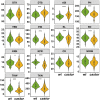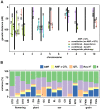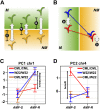The genetic architecture of host response reveals the importance of arbuscular mycorrhizae to maize cultivation
- PMID: 33211006
- PMCID: PMC7676867
- DOI: 10.7554/eLife.61701
The genetic architecture of host response reveals the importance of arbuscular mycorrhizae to maize cultivation
Abstract
Arbuscular mycorrhizal fungi (AMF) are ubiquitous in cultivated soils, forming symbiotic relationships with the roots of major crop species. Studies in controlled conditions have demonstrated the potential of AMF to enhance the growth of host plants. However, it is difficult to estimate the actual benefit in the field, not least because of the lack of suitable AMF-free controls. Here we implement a novel strategy using the selective incorporation of AMF-resistance into a genetic mapping population to evaluate maize response to AMF. We found AMF to account for about one-third of the grain production in a medium input field, as well as to affect the relative performance of different plant genotypes. Characterization of the genetic architecture of the host response indicated a trade-off between mycorrhizal dependence and benefit. We identified several QTL linked to host benefit, supporting the feasibility of breeding crops to maximize profit from symbiosis with AMF.
Keywords: Rhizophagus irregularis; arbuscular mycorrhiza; benefit; dependence; maize; plant biology; trade-off.
© 2020, Ramírez-Flores et al.
Conflict of interest statement
MR, SP, ML, BB, DA, UP, VO, RS No competing interests declared
Figures

















References
-
- Bergmann J, Weigelt A, van der Plas F, Laughlin DC, Kuyper TW, Guerrero-Ramirez N, Valverde-Barrantes OJ, Bruelheide H, Freschet GT, Iversen CM, Kattge J, McCormack ML, Meier IC, Rillig MC, Roumet C, Semchenko M, Sweeney CJ, van Ruijven J, York LM, Mommer L. The fungal collaboration gradient dominates the root economics space in plants. Science Advances. 2020;6:eaba3756. doi: 10.1126/sciadv.aba3756. - DOI - PMC - PubMed
Publication types
MeSH terms
Substances
Grants and funding
- Impact of native arbuscular mycorrhizal fungi on maize performance (Nº 62, 2016-2018)/La Comisión Nacional para el Conocimiento y Uso de la Biodiversidad (CONABIO), Mexico/International
- Ph.D. scholarship/Consejo Nacional de Ciencia y Tecnología (CONACYT), Mexico/International
- Hatch Appropriations under Project #PEN04734 and Accession #1021929/U.S. Department of Agriculture/International
- Engineering the Nitrogen Symbiosis for Africa (ENSA)/Bill & Melinda Gates Foundation and the Foreign, Commonwealth & Development Office (FCDO)/International
LinkOut - more resources
Full Text Sources

